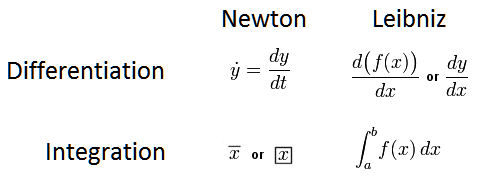Newton, Leibniz, and the Calculus of Steem
What if I told you there was more to mathematics than just the formulas you see on paper?
No doubt many here have had experience with a math class at some point in their lives. If you are fortunate, one of those classes was Calculus. As a Calculus teacher going on twelve years now, I am admittedly a little biased. I could probably go on for days dorking out about the beauty of the subject. I am not here for that. I am here to share a historical perspective on Calculus I believe is COMPLETELY relevant to the steem community.
But first, a little word association…fill in the blanks:

How did you score? I’m willing to bet if you read the title of my post, you probably knew the answers already. However, if I didn’t prime you in the title, I’m willing to bet maybe 10% out there get this correct. So why am I so “team-leibniz”?
Leibniz is widely credited as the mathematician that discovered calculus.
Let that sink in for a moment. You’ve probably never heard of the guy, but if I gave you the choice of two names in a trivia contest and asked you to choose, you probably would have chosen Newton. Plot twist: You would also be right. Because...
Newton is ALSO widely credited as the mathematician that discovered calculus.
It turns out both Leibniz and Newton discovered calculus at approximately the same time. Newton, by many accounts, probably discovered it first. Both were members of London’s prestigious Royal Society, better known as THE place you had to be a member to publish your work. Most likely both were aware of the work of one another, though they studied for different reasons. Newton was more concerned with motion, particularly the kind that explain physics. Leibniz was more interested in pure mathematics. Both made their discoveries independently.
To understand why Newton gets the credit, you have to understand the politics of the Royal Society
Netwon did not publish his findings, at first, on fluxions (what we think of as calculus) because he was a little jaded about some poor reception he received from review of his earlier work on Optics. This work, was, and is still, considered a major breakthrough in the way we understand how light works. This work was a major breakthrough, but not without its detractors. This includes the president of the Royal Society, Robert Hooke, who thought some of his theories were wrong. This caused some strong debate in the Royal Society, and essentially turned Newton into a lurker in the background for many years. He only circulated his theory on fluxions to friends, worried about more possible ridicule.
Meanwhile in Germany…
Leibniz published his work in 1684, almost ten years before Newton’s first work was published on the topic. The work of Leibniz was (and still is) widely regarded as the more intuitive understanding of Calculus. Netwon’s calculus has a very awkward notation that most mathematicians to this day refuse to use when compared to Leibniz.

It’s Good to be the King!
Or, at least the president. Both Newton and Leibniz bickered over who was the true creator of Calculus. The Royal Society eventually credited Leibniz with the first publication, but gave Newton the credit for the first discovery. When Newton eventually became president of the Royal Society, he accused Leibniz of plagiarism, something which was obviously troubling for Leibniz. His name relatively fading into obscurity for a short period afterwards. As time wore on, Leibniz was recognized and greatly admired for his contributions.
I thought you said this related to Steem?!?
You bet it does. In this allegory, think of Steem as the Royal Society, and Newton and Leibniz as fellow steemers. Steem is the place to be to share your creative and original thoughts. However, sometimes those thoughts are the same as other steemers, independently and separately created. Some people posting similar thoughts have earned differing rewards. As an example, This post from just last night was from one of the many excited users about Steem finally being listed on Poloniex. As a result, @steemed has earned $1,500 and counting , while countless others, many whom posted this announcement before, earned next to nothing.
Make No Mistake, This is All About Influence
As it should be. As @dantheman said in one of my first posts:
People value power and influence, steem power gives you the ability to influence who gets what. @dantheman
Newton had power and influence in the Royal Society to give him the power to influence opinions. Does that make Leibniz less of a person? I am sure there are countless other examples out there of people having a thought, yet someone else capitalizing on it. Influence is a part of our reality, and that reality is hard coded into the steem protocol.
But that’s not fair!
Maybe it’s not, but it can drive how we think about such things as a community. Consider this take on the whole Newton/Leibniz debate:
As a piece of history, the controversy serves as a lesson to the modern world that it is perhaps better for great minds to work together instead of trying to undermine each other. This can aid in the avoidance of stagnation in mathematical and scientific thought and advances. source
As a steem community, I think we should all understand we are working together on something bigger than us. The first platform of its kind. Petty complaining about some posts earning more than others only promotes stagnation in advances of the platform. So, go out and make another post, upvote posts you find interesting! Have fun! While we might not all wind up like Newton, we sure can all be like Leibniz!
-team leibniz
I more concerned with "second derivatives"
I should be doing my job actually reading posts and evaluating their merits.
But there's no time for that.
Whale's vote robotically and dolphins follow the whales and I must realistically assume that most minnows are "cheating" and just following the dolphins.
Thus, it simply does not pay to spend the extra time curating content.
I have to vote with the minnows who follow the dolphins who follow the whales.
In the limit, as time approaches, um, 30 minutes, all votes converge asymptotically to what the whales do. Not exactly what the original design intended?
This all depends on perspective. Do you mean paying off in terms of like consistently hitting posts in the hundreds of dollars? Maybe. But, as I said above, we all can't end up like Newton all the time. It still doesn't mean our contributions to the community aren't valued.
Hooray for calculus! This will sound silly to people who don't love math, but I think calculus was the first math I ever loved.
And by the way, we control-theorists use Newton's over-dot notation for time-derivatives religiously. :)
You and I should keep in touch!
Everything started making sense for me too when I took calculus for the first time. It want until I started teaching it that I gained a passion. I am fortunate to have a job where I get to share in this passion with others daily! Interesting to hear about the dot notation, never knew that!
"While we might not all wind up like Newton, we sure can all be like Leibniz!"
...plagiarists?
Just joking :P
Very entertaining, Keep up the great work! Upvoted